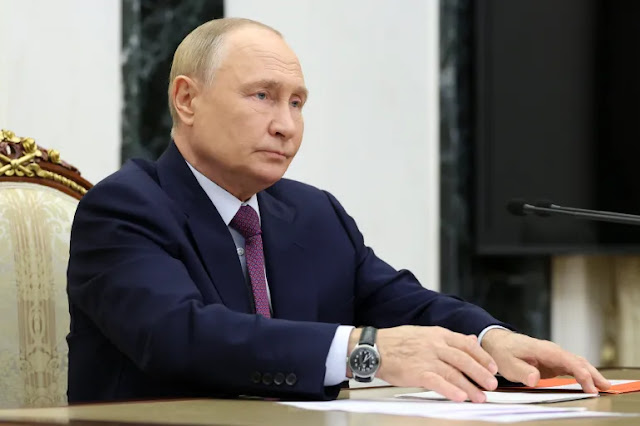The remarks suggest a significant lowering of the threshold for Russia’s use of nuclear weapons, coinciding with Western allies deliberating whether to permit Ukraine to strike targets within Russia.
Russian President Vladimir Putin addresses the Security Council meeting in Moscow [Alexander Kazakov/Sputnik/Kremlin Pool via AP Photo].
26 Sep 2024
Russian President Vladimir Putin has warned that Russia may respond with nuclear weapons if attacked with conventional arms, marking a significant shift in the country’s nuclear doctrine. During a televised Security Council meeting, Putin announced that under the revised doctrine, any attack on Russia by a non-nuclear state, if supported by a nuclear power, would be considered a "joint attack" on the Russian Federation.
Putin emphasized that nuclear weapons could be used in response to a conventional attack posing a "critical threat to our sovereignty," a vague term that allows broad interpretation. This change lowers the threshold for nuclear use and coincides with discussions among Ukraine's Western allies about providing Kyiv with longer-range weapons to strike deeper into Russia.
Although Putin did not mention Ukraine directly, he cited the rapidly evolving global landscape as a reason for revising the doctrine. This comes shortly after a Ukrainian incursion into Russia’s Kursk region and amid Moscow's slow but steady gains in Ukraine. Putin has repeatedly issued veiled nuclear threats since the invasion and suspended Russia’s participation in the New START treaty with the U.S., which limits nuclear warheads.
Ukrainian President Volodymyr Zelenskyy has urged Western powers to dismiss Russia’s nuclear threats, with his chief of staff, Andriy Yermak, calling Putin’s remarks "nuclear blackmail" and claiming Russia lacks other means of intimidation.
Russia’s current nuclear doctrine, set in 2020, allows for nuclear use in case of a nuclear strike or a conventional attack that threatens the state’s existence. However, some Russian hardliners have pushed for a more explicit policy. Putin stated that the revised doctrine clarifies the conditions for nuclear use, including in response to a massive air attack, and extends Russia’s nuclear protection to neighboring Belarus, where some of its tactical nuclear weapons are now deployed.
Russia, the world’s largest nuclear power, along with the U.S., controls 88% of the global nuclear arsenal.
















No comments: